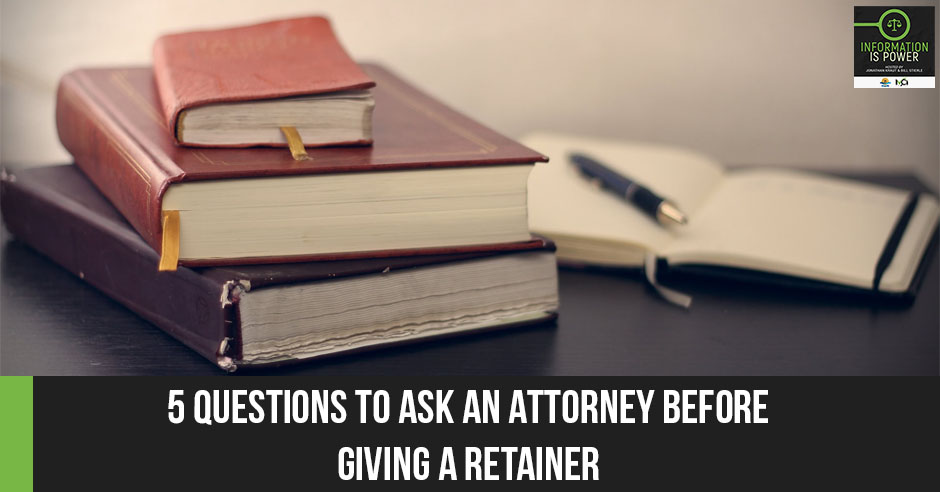5 Questions To Ask An Attorney Before Giving A Retainer
Thinking of hiring an attorney for something that’s going on in your life? There’s a few things you might have to consider before paying that large retainer. Jonathan Kraut and seasoned business owner Bill Stierle discuss the considerations you should be making before getting serious about hiring a specific lawyer or law firm. You might think that these considerations are cut-and-dry, but it does tend to get a little more complicated than that. Be prepared to do your work before making the final call.
—
Listen to the podcast here:
5 Questions To Ask An Attorney Before Giving A Retainer
How To Identify The Qualifications And Approach An Effective Attorney Or Law Firm Before Handing Over Your Hard-Earned Money
Our topic, it’s a brief one. It is Five Things to Ask an Attorney Before Giving a Retainer. I’d say it’s important, especially if you have hard-earned money and you want to hand that over to somebody. First, before you call, there are some things you want to do with the law firm that you think might help you. You want to make sure that they’re licensed. Go to your bar association and check and see if they have any complaints and make sure that they’re licensed. You want to scan for social media issues. Check the internet for news articles and other items that might be of value. Go to their website, get a feel for the organization, see some photos and try to identify their main message. I’ll talk about why the main message is important. Make an appointment. Try to see an attorney or someone professional, not just a receptionist because you have a lot of information to review and you want an expert to give you some feedback. Make sure that the law firm handles your case.
Let me give you some examples. A family law attorney probably is not the best one to go to for a probate or property case. A civil attorney may not be the right one to handle a divorce. Some attorneys specialize in criminal work, some specialize in domestic violence, some in DUI and so forth. If you need an attorney, you have something that you believe is worthy of filing a case or a suit or you were charged with a crime, you want to make sure that the attorney is on your side and it’s the right one to you. Get that in your head, please, that not all attorneys are the same. They specialize and using the right one will be helpful. We want you to succeed and we want fairness to prevail. Check that before you call.
After you make an appointment, you want to confirm that there’s no consultation fee and gather all the relevant documents and information. What’s this about the consultation fee? Some attorneys are into charging you money for everything, and if they asked you to pay them to listen to you, probably their purpose is not going to be about you. It’s going to be about them. Unless they are specialized firms and that’s the standard for their industry or that specific task, I would say probably not do that. Relevant documents. Don’t walk in with a big box and say, “I’m going to start these later. Half the things are at home. I don’t have this.” You want to have everything set up and ready because you want to respect their time and the clearer your presentation, the better it is for you. If you can bring in a timeline of occurrences or list something or even a document that shows what happened in what order and that will help the attorney be clearer as to what they can do to help you.

Hiring An Attorney: Have everything set up and ready because you want to respect their time, and the more clearly your presentation, the better it is for you.
Remember to stay focused on the case. Don’t be talking about your family and when you came over from this date or this country to that country or that state or moved from town to town, you want to talk about the case itself. Respect their time and try not to be too chummy because it’s not about being friends. It’s about being represented fairly. You want to remember that they’re your advocate. They can’t be your advocate if they’re not sure as to what you want them to do. Have the discipline not to complain, not to vent, not to show anger. Try to resist showing revenge. It’s a mechanical process. The legal system is about documents, subpoenas, hearings, testimony, depositions and so forth. It’s not about emotion. Even though emotion might be helpful when it’s time, getting ready for the case and putting the case together should not be an emotional process. We’re going to talk about some other considerations to look for.
A lot of law firms that have huge advertisements on TV, a lot of them are about settling. They want as many cases as they can to settle as many as they can. It’s a cash business. Somebody has to pay for the ads and settling cases is how they pay for it. If you’re about cash and you want money and greed is something that appeals to you, some firms are about greed. You guys fit in fine. If it’s about money for them and money for you, that might be a good match. If it’s about revenge and anger and hostility, that doesn’t always carry well in the courtroom. Some attorneys gravitate towards that because they feel that’s the client that they like.
You want to verify the firm is interested. I would caution you if some attorneys are slow in responding, hard to reach, you leave messages, and they don’t call you back, nobody keeps in touch with you, you feel abandoned, that’s not a good sign. Maybe they’re busy and a lot of good attorneys are busy. I’d say the ones that I work with work seven days a week and they’re great, but they do have someone call for them if they’re not available. Some attorneys don’t have a good support staff. If you walk into an office and it’s one person in the back room, I’d say, with no help, with no assistance, with no clerk, with no legal secretary, that’s probably not a good sign. Some firms are in the high rent district and who pays rent is you. Their fees are usually going to cover that.
Let’s say they would normally charge $400 an hour, but they’re charging you $700, that’s for rent. It might be worth it, but sometimes you don’t want to pay their rent. Consider that. Most investigative firms work with attorneys on a regular basis. We work with maybe twenty generally. You want to check to see if the law firm has at least an agency that they work with if they need to. Having a firm, using a PI organization, Private Investigation organization on a regular basis is probably a good idea.
What Are The Steps, Filings, Hearings, Motions, And Other Issues That Might Be Needed?
Let’s go to the questions. Question number one, you can ask what the steps, filings, hearings, motions and other issues are that might be needed. There’s rarely a walk-in, walk-out situation. For example, in a criminal case, you could have an arraignment, then information’s exchanged and investigations. Data review is conducted, subpoenas could be issued then a preliminary hearing, which could be a week long. After more information exchange or more witness testimony and so forth, then there’s a hearing. There are steps along the way and each one has a cost.
A lot of good attorneys are busy. Share on XYou want to be clear as to what the process is. In a civil case, it might be different point. For family domestic, you might have child protective services, you might have hearings, you might have negotiations and you might have mediation. All these things may happen having nothing to do with the issue that you’re trying to attend to, but those are steps that are usually mandatory and for a good reason. You want to write these down. You want to get an estimate of the timing of these events. When should they occur? How long should they take? You want to find out, are there any court fees or filings that you have to pay for in addition to the attorney? That first question is a good sense of what the process looks like.
How Might The Case Conclude With The Current Information Evidence Provided?
We’ll move on to question number two. How might the case conclude with the current information evidence that you provided? If you have witnesses, evidence and information, try to get an assessment from the law firm of what might happen. What’s the range of outcome? What’s the best that could happen? What’s the worst that could happen? Remember that no attorney can guarantee anything, even though they have a lot of experience. I’ve seen juries and judges come up with all things and who knows, but you want to get a reasonable range of what you think based on the attorney’s experience and the information you provided. What’s a reasonable range of expectations? Be ready for the worst scenario. A lot of times you get blindsided, something else happens and you have to be prepared. You cannot pay for an outcome. You can only pay for the process. That’s a big thing to know.
What Additional Evidence Is Needed To Get A Better Result Or Ruling?
Question number three, what additional evidence is needed to get a better result or ruling? This is critical. A lot of times, you walk in with things that you think are adequate, “This is what I need. I’m ready to go.” The attorney goes, “No, we need some witnesses. We need some camera footage. We need text messages. We need to print these out and so forth.” Rarely will you have everything ready when you walk in. If you do, you probably do what I do for a living. It’s tough to have everything ready. Be ready to do some homework. Brace yourself. You want to ask how an investigator will impact the case. It’s common that investigators will issue subpoenas, take statements, measure distances, talk to witnesses.
It’s important that be considered because perhaps, spending a few dollars on getting information introduced into the court will change the whole case. In fact, we’ve seen that a lot. You want to write down specific things to come to mind like who are the names of the witnesses that should be contacted? Are there any documents, videos or photos that might be relevant? Do you have any subpoenas that you think might be needed to be issued? You can’t issue those. Only an attorney can issue the subpoena. You’ve got to get all this in your head. How will that change the case?
Does Your Firm Use An Investigations Team To Support Your Efforts?
Question number four, does your firm use an investigations team to support your efforts? Why is this important? I say a small percentage, maybe half or less, don’t need attorneys for your case, but perhaps more than half will. The reason is there are a lot of things that only investigators can do. The attorney cannot go out and talk to witness and then testify as to what the witness told them because they’re in the court itself and they cannot cross-examine themselves. They use us or a third party to get information that could be cross-examined. That’s important to know. Especially regarding child support, abuse cases, criminal cases, you need to have an agency, not the law firm that can provide support. An outside agency can gather information, can be cross-examined, can testify and can introduce information and so forth.
Investigations teams will help a law firm. Usually, a law firm will use the same one or a few of them. If you want to know, do you have an investigations team that you always work with or do you have a PI they always work with? A good relationship between the investigator and the attorney is crucial because they’re on the same page. There are some things again that PIs will do, something we call a dirt search. Is there anything in the person’s past, the person that you’re opposing or you’re suing or is involved with you in some way that could show that their behavior is not wanted or is not ethical? That will often repudiate their claims and their assertions. That can be helpful. The judge wants to know who’s who? Who is telling the truth and who is not? Who is exaggerating, who is not? Who’s highly emotional when it doesn’t matter, and highly emotional when it does matter? They want to know these things.

Hiring An Attorney: Expect to pay thousands of dollars for good support. Professional support from a doctor of law is worth it.
What Are Your Fees And Rates And How Are These To Be Paid?
Question number five. What are your fees and rates and how are these to be paid? You’ve gone through, you’ve shown your information. The attorney says, “Yes, we do that. We’re interested. I’ve got a PI firm that I work with. I’ve got a good staff. This is our expertise. We do this all the time. We charge $1,500 an hour and I need a $100,000 upfront.” For most of us, that’s not going to work. You want to have a phased payment process. A retainer is a money that you hand to somebody to open the case and get started.
What does that retainer pay for? Some high-end law firms charge high fees, run up a big bill and they’re not any better or worse than a lot of companies that charge half. Some of them are worth it. You’ve got to decide what the value is of winning this case or getting the right result that you’re looking for. A word of caution, the more you spend does not guarantee what you want. In fact, spending money does not mean that you can pay for an outcome. You have a better chance of getting what you want if you do it right. A lot of times, it’s not the dollar amount, it’s the way that the firm goes about their business, the resources that they use and the methodology that they follow. You want to make sure, and this is important, that you don’t run out of money halfway. The law firm drops you and you’ve got to start over again and pay somebody all over again. That’s not good.
You want the same firm to take you from beginning to end if you can. Remember that attorneys are doctors, they’re doctors of law. Their purpose is to use their expertise and experience and many of them deserve a lot of money. They’ll do a great job, something that you or I or a non-attorney cannot handle. I’ve been in court hundreds of times and I would never represent myself. I have no idea what’s going on half the time. I don’t know what these motions are. I don’t know what this code or that code means. You want to get a professional that understands this format because if the format is not followed, then evidence and information sometimes cannot be admitted.
You want to have a retainer or payment process that you can handle. Some firms take a big retainer and then charge you every step of the way. Some firms don’t take any retainer, but they take the money at the end, like for traffic collision or an accident. You’ve got to decide what is right for you. Expect to pay thousands of dollars for good support. Professional support from a doctor of law is worth it. We’ll help you get what you want. Maybe there’s no promise or guarantee, but if you have a substandard process, the product will probably be substandard.
I hope that is helpful. If you have any questions or you’re not sure, your bar association usually has people that can help you determine what attorney you need from domestic to probate to criminal to civil. There are all kinds. There are some that specialize in abuse and sexual assault, domestic violence or protection. You want to maybe get the bar association to help you identify the kind that you want. You want to interview people and see who you feel comfortable with. They’re your partner in the lawsuit or action that you were involved in. You want to have someone that you like and that believes in your view. You may convince them, but it may not convince the quarter jury. At least that’s a good start.
No attorney can guarantee anything, even though they have a lot of experience. Share on XRemember that the more information you have, the better support you can receive. I want to invite everyone to go to our website, www.NetCheckPI.com. Call my office, call me, we’ll try to help you if we can, even with advice. Information is power, good decisions start with great information. Please try to find the right law firm. Try to be careful and deliberate about it. Don’t be emotional. Don’t be crazy. It’s a business issue, essentially and it will take money. My hope is that everyone will succeed and the fairness will prevail. Thank you for reading.

